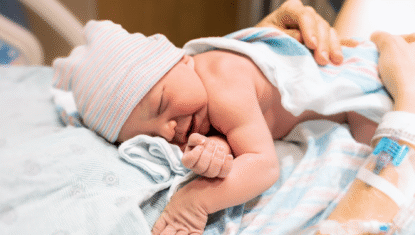CHEO is a world leader in pediatric pain research. Research conducted by CHEO and CHEO RI staff include development and testing of pain assessment tools, pain prevalence studies, systematic reviews of pain interventions in infants and children, randomized controlled trials of pain management interventions, and knowledge translation studies concerning improving pain management in hospitalized infants and children.
Related News
Research Projects
-
Virtual psychoeducation for improvement of pain catastrophizing in pediatric presurgical patients and caregivers: A proof-of-concept study
03/10/2024
Youth (n = 43) and caregivers (n = 41) attended a virtual, group-based single-session intervention (SSI). Single-session intervention content addressed pain neuroscience, PC, and adaptive coping strategies for managing pain and PC drawn from cognitive-behavioural, acceptance and commitment, and dialectical behaviour therapy approaches. Participants completed questionnaires assessing PC at preintervention, postintervention, and two weeks postsurgery. Youth mood and anxiety were assessed at preintervention.
-
Triage Decision-Making in Interdisciplinary Pediatric Chronic Pain Programs
10/04/2024
Pediatric chronic pain is considered a significant problem worldwide (Tutelman et al., 2021). Chronic pain in children and adolescents not only increases risk of mobility issues, significant fatigue, poor sleep, school absenteeism, decreased cognitive function, and worsening mental health (Miro et al., 2022), but also increases risk for opioid misuse in youth (Pielech et al., 2020). Interdisciplinary pediatric chronic pain programs are the gold standard for the treatment of chronic pain (Law et al., 2013); however the limited number of programs (Caes et al., 2018) may contribute to prolonged wait times. Lengthy wait times to access pain care in children and adolescents have been linked to increased frustration, anxiety, and feelings of hopelessness (Palermo et al., 2019). Because of the variability in complexity and disability between pediatric chronic pain patients (Wagner et al., 2013), it is essential to optimize triage decisions to chronic pain programs to accurately prioritize pain care for patients in highest need. Still there is no established model or framework for this purpose.
-
A systematic review of the biopsychosocial dimensions affected by chronic pain in children and adolescents: identifying reliable and valid pediatric multidimensional chronic pain assessment tools
12/01/2023
Pediatric chronic pain is a complex experience that is often challenging to describe and measure. Multidimensional tools that evaluate the biopsychosocial impact of chronic pain in pediatric patients can help clinicians to prioritize and tailor interdisciplinary pain care; yet, the psychometric value and clinical utility of such tools has not yet been systematically studied in the literature. The purpose of this review was to identify multidimensional biopsychosocial tools used in pediatric chronic pain, synthesize their reliability and validity evidence, and draw on this evidence to describe the relationships between chronic pain and biopsychosocial domains. The search involved 2 phases to (1) identify eligible tools and (2) conduct a measured forward citation search of tool development articles. Tool eligibility was guided by the Multidimensional Biobehavioral Model of Pediatric Pain and study eligibility was focused on primary chronic pain diagnoses unrelated to disease. Data extraction was focused on reliability and validity evidence of eligible tools, guided by the Standards for Educational and Psychological Testing. Results yielded 6 tools that included 64 eligible studies, highlighting 84 significant relationships between pain and functional interference across 11 biopsychosocial variables. All tools were shown to have good internal consistency and evidence of validity, primarily through relationships to other variables. Of the 6 tools, the most brief and easy to use were the most under studied. Further psychometric research is warranted for these tools to investigate their clinical utility and psychometric properties in guiding and prioritizing pain care for children and adolescents.
-
Evaluating the French version of an online training course for a pediatric pain assessment scale
24/01/2022
Discussion: An improvement of the quality of videos linked to mild pain, and the quantity of videos for all levels of pain, is required for this study to be replicated among a larger sample.
-
Modeling adult COX-2 cerebrospinal fluid pharmacokinetics to inform pediatric investigation
01/11/2021
Transfer of unbound COX-2 inhibitors from plasma to CSF compartment can be described with a delayed effect model using an equilibration rate constant to collapse observed hysteresis. An additional transfer factor was required to account for passage across the blood-brain barrier. Use of a target concentration strategy for dose and consequent plasma (total and unbound) and CSF concentration prediction could be used to inform pediatric clinical studies.
-
Medications to manage end-of-life symptoms in the immediate postpartum period
18/08/2021
There is a need for standardization of the medical management of infants born with life-limiting conditions whose parents choose to pursue palliative care.
-
Medications to manage infant pain, distress and end-of-life symptoms in the immediate postpartum period
18/08/2021
-
Development and pilot evaluation of an educational tool for the FLACC pain scale
01/12/2020
This study aimed to develop an online educational tool and evaluate its effect on nurse knowledge, user confidence, and scoring accuracy.
-
Cannabis use for therapeutic purposes by children and youth at a tertiary teaching hospital in Canada: A retrospective chart review
02/03/2020
Medically supervised cannabis use occurred most often in patients with intractable or refractory seizures. According to these data, seizure response is variable, and initial decreases may be transient for pediatric patients using cannabis. To ensure greater consistency and rigour in the conduct of prospective research and thus to generate better-quality research on the therapeutic effects of medical cannabis, development of a standardized care record is needed.
-
Predictors of postoperative respiratory complications in children undergoing adenotonsillectomy
15/01/2020
Prediction modeling concurrently evaluating comorbidities and polysomnography metrics identified cardiac disease, airway anomaly, and young age as independent predictors of PRAEs. These findings suggest that medical comorbidity and age are more important factors in predicting PRAEs than PSG metrics in a medically complex population.
-
The Accuracy of Prevalent Vertebral Fracture Detection in Children Using Targeted Case‐Finding Approaches
01/11/2019
Back pain was assessed by patient report, LS BMD was measured by dual‐energy X‐ray absorptiometry, and PVF were quantified on spine radiographs using the modified Genant semiquantitative method. Forty‐four patients (11.0%) had PVF.
-
No association between metoclopramide treatment in ED and reduced risk of post-concussion headache
04/12/2018
Further research is necessary to determine which pharmacotherapies may be effective for acute and persistent post-concussive headache.
Researchers
-
Nick Barrowman
Associate Scientist, CHEO Research Institute
-
Maala Bhatt
Scientist, CHEO Research Institute
-
Natalie Bresee
Investigator, CHEO Research Institute
-
Matthew Bromwich
Investigator, CHEO Research Institute
-
Juliana Choueiry
Investigator, CHEO Research Institute
-
Dawn Davies
Investigator, CHEO Research Institute
-
Emanuela Ferretti
Investigator, CHEO Research Institute
-
Megan Greenough
Investigator, CHEO Research Institute
-
Sherri Katz
Senior Scientist, CHEO Research Institute
-
Christine Lamontagne
Investigator, CHEO Research Institute
-
Andrée-Anne Ledoux
Scientist CHEO Research Institute
-
Claudia Malic
Investigator, CHEO Research Institute
-
Danijela Maras
Investigator, CHEO Research Institute
-
Kimmo Murto
Investigator, CHEO Research Institute
-
Christina Vadeboncoeur
Investigator, CHEO Research Institute
-
Private: Régis Vaillancourt
Senior Scientist, CHEO Research Institute
-
Stephanie Veldhuijzen van Zanten
Investigator, CHEO Research Institute
-
Leanne Ward
Senior Scientist, CHEO Research Institute
-
Roger Zemek
Senior Scientist, CHEO Research Institute




















